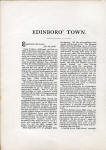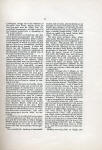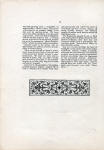| 14 |
eur014 |
EDINBORO' TOWN.
EDINBURGH, scotland,
July 22, 1889.
dear citizen
:—Although we have resided
in Scotland only two days we are able
to give some valuable advice to any
who anticipate moving hitherward,
especially as to some articles of male attire, which we
recommend being left in America.
First among these is the beard, because
no greater nuisance has attended
us than the unsuccessful search for a
barber. At last we succeeded in the chase, and now feel very
much as though our visage had been
well rasped with a nutmeg
grater, and the blood sapped up with
a towel "founded in the eleventh
century," like all other
things here, and retaining all the odors of sanctity of those
early ages. What would these folks
think of one of our tonsorial artists?
Of
course in this good country no barbers
nor street cars nor other similar conveniences can be found on Sunday,
so we
are compelled to go to church all unshaven
and unshorn. But it was our
high privilege to hear a
sermon which displaced all thoughts
of things temporal and raised even our poor minds truly
heavenward.
It was in the old St.
Giles' church, the established kirk
of Scotland—a grand old
building, almost equal to St. Mingo's of
Glasgow, which has a history of its
own, its pulpit having been
occupied by John Knox, and a tablet in the floor indicating
the spot on which a "brave Scotch
lassie" (Jennie Geddis) threw
a stool at the head of some Episcopal divine who dared to read a
collect—a curious deed to be so
commemorated, but tempora mutantur, and the good Dr. Cameron
Leeds most earnestly to-day
read his prayer out of a book, and remarkably good ones they
were, too, and his choir chanted the
psalter and glorias right gloriously.
Most especially were we pleased with the sermon. All the surroundings
were
quaint and strange to us. The immense
pillars of stone looming up in all directions,
the arched stone overhead, the numerous vergers in black gowns, trimmed
with scarlet, moving with mien of dignity
in every aisle; the thousands of people,
plainly dressed, earnest and devout;
the sweet, low toned organ; most of
these things might have been calculated
to
make us feel strange and far from home. But when the sermon began we
almost fancied we were sitting
once more under the preaching of our own dear Father in God, Bishop At-kinson.
The language was so pure and
simple, the arguments so logical and direct, the application so earnest
and entreating—ah! all surroundings were forgotten, and when we heard
the last word
we
could not but feel that the preacher
suited his church, and together they were
calculated to do great good to all men
who
can and will accept it.
The
service being over we recommence
our
exploration of this lovely city. Near
the church door (itself worth a trip here
to see, adorned as it is
with the statuettes of the Scottish
kings) we see worked in the
pavement in a heart of large size, known as the "Heart of
Midlothian," and marking the very
spot on which Jennie Deans
stood when she refused to
tell a lie, even to save the life of her beloved
sister; a suitable exemplification
of the truth which this church will
ever teach.
A
short distance down High street we
find the old Cross of Edinboro', which has
recently been restored and now makes a
most striking monument surmounted by
the
arms of the nation and bearing the inscription "Sic itur ad astra;"
again, as we think, suitably placed near the old church, encouraging
as it does to good
and glorious works, which must ever accompany
the true faith.
A
ramble down High street towards |
 |
| 15 |
eur015 |
Canongate brings us to the
residence of the great John Knox, whose grave we
have just seen near St. Giles', and oh!
wonderful incongruity, we find a part of his residence turned into
a dramshop of the worst variety.
A
little further on we find the old Tolbooth
prison and opposite the residence
of
the Marquis of Huntley, built in 1570,
and presenting on its front many quaint
Latin legends, of which we wish we had
space to give you a translation. Nothing
else prevents us, of course. A little further
is the old Tolbooth church, and again
one of the numerous residences of the Marquis of Darnley, in which one
of his vests is still well
preserved.
A pleasant drive in a cab carries us to
the
foot of Arthur's Seat, and we cannot
resist a scramble to its summit. Hard
though the climb was we were amply repaid,
and seated on this lofty rock, looking
out on a view unequaled, we must
think, in the wide world, the thoughts of
the
morning sermon sweep back upon us,
and we decide that this scene is its true
application. Surely here one may get a realization of the presence and'
merciful goodness of the great God and Father of
ns
all, which the preacher told us is needful
before we can hope to attain to success
in our life.
Near by our feet
juts
out boldly the famous Salisbury craig, and at its foot the
humble cottage of Jennie Deans is seen,
surrounded by a sweet garden, and situated on the lands of the Dumbedikes,
whose lines can still be distinguished, and to the southward the
road to London which Jennie Deans
traveled on her mission of
sisterly love; while at a short distance
stands the very church in which
good Reuben Butler held forth, and
where Jennie called on her
way. Even there it was that
the Laird of Dumbedikes
prevailed on the stubborn pony to overtake
his master's sweetheart, who with many pangs gave her the "siller" for
her journey.
Turning to the northward we recognize
without assistance the Bog of the Robbers
and the round hill on which Madge
Wildfire posed, and near by see the pile of
stones which, we are told,
is the cairn where Effie had her
trysting with her gay lover.
The veritable St. Anthony's church still
stands, but in ruins, and we drink an icy draught of water from this
famous well.
Think, dear children, of our being permitted
to drink from the same spring as the dear, truthful Jennie Deans! Don't
you think we ought
to be much better hereafter ? Well,
we will try to be.
The
view from Arthur's Seat, which
rises nearly 900 feet above sea level, surpasses anything we ever
imagined in perfect
beauty. The grand city of Edinburg,
the calm and lovely Frith of Forth, spanned in the distance by
the mighty bridge, the isle of Inch Keith, the distant mountains of Berwick Land and
Bass Rock, the nearer towns of Portobello and Leith, the bright
sun and glorious bracing air, the
green, aye greenest of grass, under foot, and extending to the
very water's edge, covered with thousands of fat sheep, all happy under
the care of a good shepherd assisted by his
faithful collie—all these things
combine to make up a picture
which one must see to
appreciate.
Sunday evening, after a
dinner at the Windsor hotel long to
be cherished in our memory,
we attend service at the Cathedral
of St. Mary's, and churchman as we
are, we must confess to
disappointment. How different
from the morning, both the
service and the sermon. The former "past
man's understanding," truly if that
be in its favor, and the sermon the same old seven-and-six that
we have heard from boyhood, about this Sunday being the
"seventh Sunday after Trinity," etc.,
etc. When will our preachers
learn that repetition, even
of truths, may be carried ad
nauseam? When they do, the
church will be more successful
in winning souls.
We
were glad when the talk was over
and we once more emerged on the grand
old
streets. A kind Scottish gentleman,
of
whom we have met scores, directs our
course to a high bridge, spanning a deep
and wide ravine, through which the
"waters of the Leith" rush
toward the sea, albeit rather
polluted with the industries
of Leith, and on either side a sweet garden, inviting us to a nearer
look than we are now enjoying from the top of the over spanning arches 200
feet in height. Here we linger until dark, that is 10.30
p. m., and then regretfully go on
our wav to bed.
Monday morning finds us
bright and
|
 |
| 16 |
eur016 |
well and enjoying such a breakfast as
seldom falls to the lot of man. The poetry
of Scotland to us
consists chiefly in its fish and
its mutton chops. We have
never seen their excellence even distantly
approached. Their sole fish is
delightful, and for the first time we had a whiting
served with his tail in his mouth,
reminding us of the
passage in 'Alice
in Wonderland," which we never understood before.
Another poem is the
bread, and an Edinburgh roll, called a crescent, is something to dream about.
Away we go to look at
Scott's monument, most worthy both of this city and of the great man
whose virtues it commemorates. We wish we were able to describe it
justly, but any effort would give you but a poor idea of its exquisite
beauty, so we can only beg you to come
and see for yourself.
And now to the grandest of all castles,
perched upon its mighty,
rugged hill of rock, to which it is so closely built that
one can scarcely tell where the work of
God stops and that of
man begins; all seems equally
massive and destined equally
to endure until heaven and earth shall pass away.
The Esplanade, happily for us, is filled
with Highlanders drilling, dressed in their
curious uniforms, their bare legs and
Cameron plaids, truly a picturesque picture
they made. But we leave them, to
seek the older works.
Just now we hear
striking the hour of midnight on
the solemn bell of the Abbey of Melrose. Solemn, indeed, it sounds,
although we have been told
it is entirely modern,
having been placed in its present position not earlier than the
beginning of the fourteenth
century. However, that is old enough to warn us that this
short night is well nigh spent,
and we will hie us to our
couch and say good night and threaten you with "more
anon."

|
 |